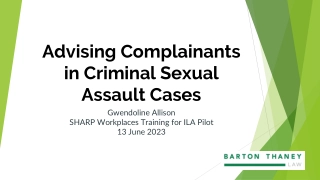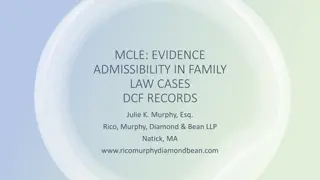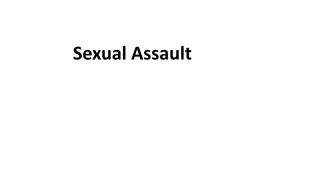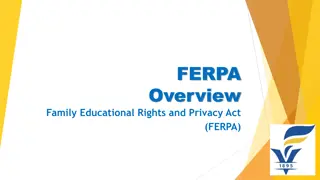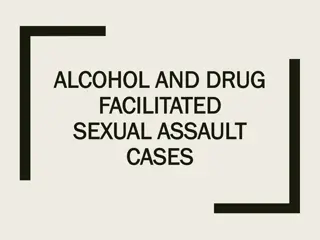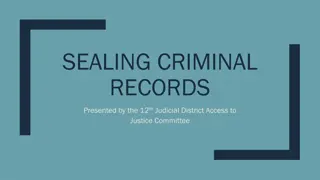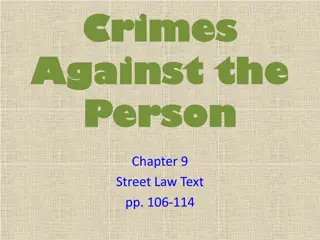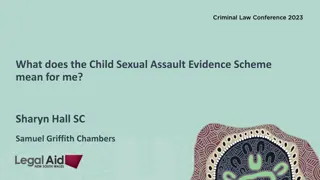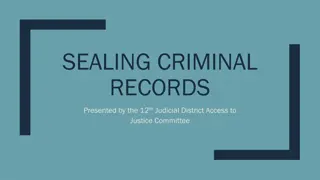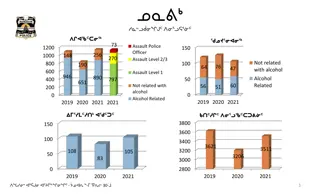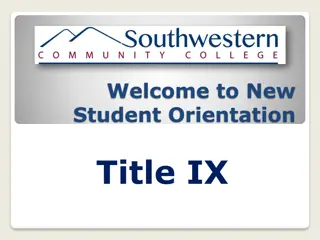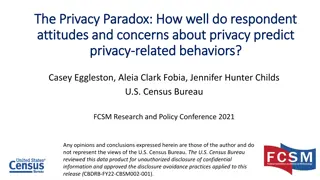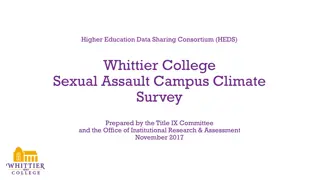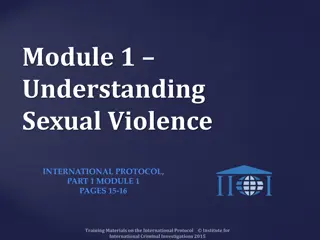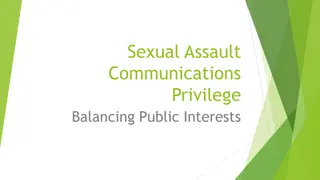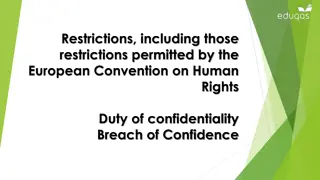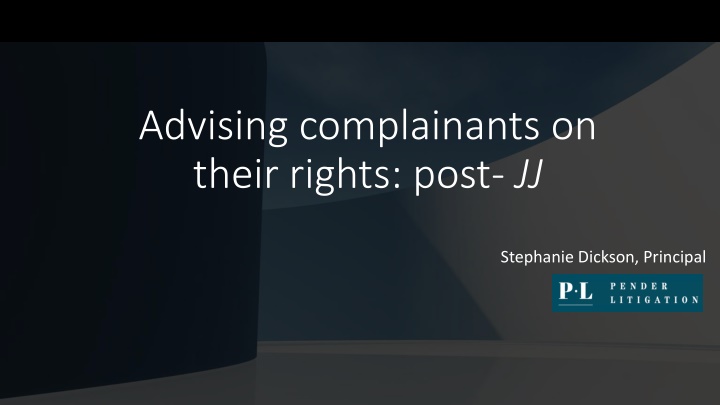
Advising Complainants on Legal Rights: Overview of Legal Schemes and Records
Gain insights into advising complainants on their legal rights, including a review of legal schemes, the concept of records, and historical developments. Explore key aspects such as records in the accused's possession, prior sexual history, and legislative history. Understand the implications of Bill C-51 and the scheme's application in court proceedings.
Download Presentation

Please find below an Image/Link to download the presentation.
The content on the website is provided AS IS for your information and personal use only. It may not be sold, licensed, or shared on other websites without obtaining consent from the author. If you encounter any issues during the download, it is possible that the publisher has removed the file from their server.
You are allowed to download the files provided on this website for personal or commercial use, subject to the condition that they are used lawfully. All files are the property of their respective owners.
The content on the website is provided AS IS for your information and personal use only. It may not be sold, licensed, or shared on other websites without obtaining consent from the author.
E N D
Presentation Transcript
Advising complainants on their rights: post- JJ Stephanie Dickson, Principal
Overview Overview of legal schemes and history Brief review of R v JJ, 2022 SCC 28 What is a record? Practice points from the perspective of complainant s counsel Emerging Issues
Records in the Possession of the accused s. 278.92 Records in the possession of a third party s. 278.2 Prior Sexual History s. 276 Overview of Existing Schemes Factors to be considered: s. 276(3) Factors to be considered: s. 278.92(3) Factors to be considered: s. 278.5(2) Application governed by ss. 278.3(3) and (4) Application governed by s. 278.93 Hearing (in camera) ss. 278.4(1) and 278.6(2) Hearing (in camera) s. 278.94
History 1982: original s. 276 scheme enacted; struck down in Seaboyer, [1991] 2 SCR 577 1992: Parliament reenacted s. 276; upheld in Darrach, 2000SCC 46 1997: ss. 278.2-278.91 (third-party records); upheld in Mills, [1999] 3 SCR 668 Gaps: no procedure governing circumstances where an accused had possession of records for which a complainant has a REP
Records in the Possession of the Accused: s. 278.92 Bill C-51: Parliament s attempt to remove barriers that deterred complainants from coming forward Scheme engaged: (1) records in possession of accused; and (2) accused intends to adduce those records at trial Stage 1 inquiry: s. 278.93 is the evidence capable of being admissible Stage 2 Inquiry: s. 278.94 test (1) relevant to an issue at trial; and (2) significant probative value that is not outweighed by the danger of prejudice to the proper administration of justice
What does it mean to adduce The scheme is engaged even if the defence seeks to question the complainant about a record and does not seek to tender the record itself: see JJ, paras 76-81 But not if the accused has independent knowledge of the information: see JJ, para. 76
What is a record? Is it a record within the meaning of s. 278.1? If it is not a record , then the scheme is not engaged. If it is a record , does it contain evidence of other sexual history (ie. 276 evidence), including sexual communications (s. 276(4))? If yes (both a record and 276 evidence), then it should be treated as 276 evidence: J.J., para. 34 If a record but not other sexual history, has appropriate notice been provided? Can truncate the notice period if in the interests of justice : J.J., paras. 86, para. 190 General rule is that pre-trial applications should be heard pre-trial but frequently these issues are litigated mid-trial Mid-trial applications should not be the norm: J.J., paras. 85-86
What is the definition of a record s. 278.1: any form of record that contains personal information for which there is a reasonable expectation of privacy reflect societal understandings about the fundamental right to be free from unwanted intrusion into our personal lives (see: JJ, para. 57). Two categories: enumerated types of records and non-enumerated Enumerated (s. 278.1): medical, psychiatric, counselling, education, employment, child welfare, adoption and social services records, personal journals and diaries etc. Must proceed with an application regardless of the content Non-enumerated: contains information of an intimate or highly personal nature that is integral to the complainant s overall physical, psychological or emotional well-being Motion for direction: held in camera; defence not required to reveal the documents; summary of information will likely be required to make argument
What is a record? ss. 278.92 to 278.94 If record falls within an enumerated category, accused must proceed with application, regardless of the specific content of the record: JJ, para. 39 Non-enumerated records require a fact-specific analysis to determine whether the record contains personal information for which there is a reasonable expectation of privacy
What is a record cont. The sensitivity of the information is the focus, not the medium by which the information was shared: JJ, para. 49 Analysis is on both the content and context of the record Not content-neutral, unlike s. 8 of the Charter: JJ, paras. 48-49, 54 If the information in a non-enumerated record is similar to what would be contained in an enumerated record, this is a useful indicator that the record raises significant privacy interests and should be subject to the record screening scheme: JJ, para. 55 Type of information that impacts dignity could include (without limitation): discussions regarding mental health diagnoses, suicidal ideation, prior physical or sexual abuse, substance abuse, or involvement in the child welfare system: JJ, para. 55
Is there an REP in text messages? It depends there may be an REP in some text messages, but not others Fact-specific; not categorical Post-JJ, see: R. v Niemiec, 2022 ONSC 5549; R v KD, 2022 ONSC 6105; R v. KML., 2022 ABKB, 710; R. v. JD., 2022 ONCJ 544; R v. C.T., 2023 ONCJ 124; R v GG, 2023 PESC 16; R v DM, 2022 ONSC 6699 (affidavits are records); R v TW, 2024 BCPC 245 (affidavits not records)
Standing Complainants (and their counsel) are not parties Standing is limited to the issue of admissibility Pre-trial applications for which complainant s counsel does not have standing may impact position on records applications
Practice Points: presumptive inadmissibility vs. relevance Don t assume you need to oppose every application You might consent to an application for the purposes of production but not for the purposes of admission Providing an express waiver for one purpose does not mean it is waived for all purposes The complainant s interests may be best served by admission of the records
Practice Points: meeting with vulnerable clients Trauma-informed approach: go slow; take breaks; schedule enough time; take time to explain your role and the judicial process Consider how much information to provide to the complainant to get proper instructions; providing the application itself might open the complainant up to allegations of fabrication and taint Retainer is limited
Emerging Issues The scheme does not apply to the Crown s use of records: see JJ paras. 73-75 The scheme applies to records obtained via O Connor or s. 278.1 third party Mills applications Privacy interests engaged over production vs. admission are different: see JJ, para. 50 S. 278.92-278.94 is about admissibility and use Inadvertent disclosure by the Crown to the defence

